|
Versión en español
 Since
he entered the business along with his friend Kenneth
Branagh in Henry
V he has given us a lot of wonderful scores to enjoy with.
He's one of the most eclectic composers of his generation and every
new score from his hand is like a gift to us score-geeks. In the wake
of his last composition, Secondhand
Lions, we took the serious challenge of getting what you're
about to read done...and so we did. Full of the funniest anecdotes
we have heard so far, this interview was a joy in the making. We would
like to thank all the efforts done to get this interview done...thanks
to Cathy Mouton, Maggie
Rodford and Julia
Lister...without your help this couldn't have been done. Since
he entered the business along with his friend Kenneth
Branagh in Henry
V he has given us a lot of wonderful scores to enjoy with.
He's one of the most eclectic composers of his generation and every
new score from his hand is like a gift to us score-geeks. In the wake
of his last composition, Secondhand
Lions, we took the serious challenge of getting what you're
about to read done...and so we did. Full of the funniest anecdotes
we have heard so far, this interview was a joy in the making. We would
like to thank all the efforts done to get this interview done...thanks
to Cathy Mouton, Maggie
Rodford and Julia
Lister...without your help this couldn't have been done.
Some time
has passed since we did this interview, that's the reason why,
although published now, you would not find any reference to Patrick's
involvement in Harry Potter and the Goblet of Fire. Seville,
one morning of a very atipical day. A not so distant bell rings...
Patrick Doyle (PD): Hello Sergio, how are you today?
BSOSpirit (BS): Hi Patrick, I'm fine, thanks, and you?
PD: I'm very well, thank you, looking forward to
do this...
BS: Well, if you're looking forward to it, let's begin.
PD: Brilliant! BS: I think we should begin with the films you've done
with Kenneth Branagh, and I'm sure you have been asked this question
a hundred times...how did your relation with Kenneth begin?
PD: I was working as an actor in a play called "Man equals man" by Bertolt
Brecht...and I was working there with a close friend of Kenneth who
told him that I was an actor but also a composer...it was pure luck that Kenneth was
scouting for a composer to his newly formed theatre company, Renaissance
Feature Company...so we met and got along very well, and that was it...
I wrote the music for one play, and decided I didn't want to act anymore; I
was tired of it, and since I was a musician before an actor I could go back
to my first love... BS: And from working in the theatre you got to work
in your first movie together, Henry V. We know that the "Non nobis
Domine" theme was written before shooting and that Kenneth played
it when the movie took place. Has this happened again in any of the movies
you've done with him, for example in the creation scene of Frankenstein or
the overture for Much Ado About Nothing? 
PD: No, the creation scene in Frankenstein was the first major scene
to be cut in the movie and did never change from its first incarnation, so
I had a long time to study it and discuss with the sound effects people whether
to write a music that would play around the sound effects, the banging and
the crashing...so I worked a long time to get every move in the music to fit
perfectly with the picture (humming the Creation piece). For Much
Ado I have written many of the main themes long before I started scoring
the film and being in Tuscany made that process so intimate and easy... BS:
Given the closure of your relationship with Kenneth, does he give you
any hindsight of the music he wants for the picture?
PD: No he's very specific about some things like melody and themes...for
example in Hamlet, I had to play five different main themes to him until
he was satisfied with one of them...then I went onto composing the rest of
the score...but coming up with a main theme that he likes is always very difficult. BS:
And what would you say was the most difficult main theme to compose for him?
PD: I would probably say Hamlet... BS: It is one of your most
complex works... and I love it by the way...
PD: Thank you very much... BS: Back to Henry V, what did you
felt when Prince Charles, having loved the "Non Nobis Domine",
approached you to compose "The Thistle and the Rose" to his Grandmother?
PD: There's a very funny story around that composition... if you want to
hear it... of course. BS: I'm all ears (laughs).
PD: (laughs) We were on holiday and the post arrived the postman told me "we
need you to sign down here, there's a letter from Buckingham Palace..." BS:
Oh, my! (laughs)
PD: That was me! (laughs). All I could think was "I'm not the owner". Anyway,
while reading it I was very flattered and very surprised...it was a handwritten
letter...and I was absolutely thrilled... BS: And did you find any difficulties
in composing that piece?
PD: Yeah, it was very, very difficult...we in the Renaissance Feature were
world touring and it was a pity because I did not have time to see any of the
places we went...I spend the entire trip composing the piece. BS: Ok. Well
there's one more thing about Henry V that I want to ask you. What truth
lies in that you found your inspiration for "Non Nobis Domine" while
being in the bathroom?
PD: (very seriously) All of it. BS: (laughs) Really?
PD: Yeah. For the middle section of the theme I knew I had to have something
very different than the rest. So, one evening I'm in the toilet, and while I'm
doing it, something begins to hum in my mind (humming the central part
of "Non Nobis Domine") ...and suddenly I was "please God do not allow
to forget the theme"...so I finish my works in the toilet...and I wash my hands
(laughs) ...I'm a very clean man...run down the stairs...while my wife keep
telling me "What are you doing running down the stairs?, come to bed! is midnight!"...and
I'm like "I can't...I can't!"...so I get down and start to write the theme
in my Filofax while it is strong in my head...and that was it. BS: What
a relief! (laughs)
PD: Yeah, a great one! (laughs). And that is not the only time this has
happened to me...a lot of times, when I have been working during a very long
time and I go to bed, when I'm more relaxed and tired...there, is where the
best ideas come to me... BS: The first thing I ever heard from you, and
one of the first cd's I ever bought was "Dead Again". I love your music,
and also the great film it accompanies. The final scene of the picture is the
work of two geniuses, Kenneth at the images and you at the music. The
overall atmosphere of that scene resembles that of Hitchcock and his
way of filming. Did you have in mind that fact when composing Dead Again?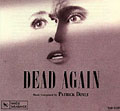
PD: Nope...maybe subliminally, but not consciously...a lot of people sees
that resemblance between me and Herrmann and I do suppose it has to
do with the influence Slavic music has in my way of composing and so
did in Bernard Herrmann...so there you have the possible resemblance
between our works. We both write in a very unambiguous way... BS: Yeah,
very directly...looking at your filmography you can find a lot of themes that
are very direct, very primal if you like...
PD: I suppose so. 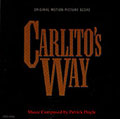 BS:
Well, you have "The Battle of Agincourt" in Henry V, the action
cues of Dead Again, "The Creation" from Frankenstein...and
of course "Central Station" from Carlito's Way. That tour de
force theme is one, may I say, of your masterpieces... The thing is, did Brian suggested
you something, or was it entirely your idea?
PD: No suggestion from Brian... BS: No suggestion at all?
PD: None. The only thing Brian told me was "Get on with it!"... BS:
(laughs) Very direct!
PD: (laughs) Just that... "Get on with it!" He hires the composer to do
his job. He's very direct and very confident in his movie come what may... BS:
That seems to fit perfectly with the tone of his movies... BS:
Moving forward a little in time, we arrive at the point when you are first
nominated to an Oscar Award for the score to Sense and Sensibility...what
remembrance do you have of this event?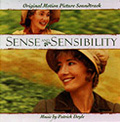
PD: By this time in my life I've done quite a few movies and when I was
told that I was nominated I was surprised, but also very happy and thrilled
to having been nominated for a score I was so proud of and in which I have
worked so hard along Emma (Thompson) and Ang (Lee)...so it was
a joy and extreme fun being in the huge party that followed the ceremony...
But these things have to be taken as what they are, a by-product of your work
... If you take your profession as a way to get prizes, for me is as getting
the car before the horse...if you know what I mean... BS: Completely. BS:
Two of your collaborations with Kenneth, Hamlet and Frankenstein are
among your most complex works in terms of orchestrations and the amount of
characters involved in the story. How did you feel working in such films?
PD: During a long time in my life I played Osric in stage and in
doing so I was very familiar with, not only the character, but with the whole
play. I got very intimate with it playing every night, so when the time came
to the film I instantly began working on what have to became the central piece
of the score, which Kenneth loved...and also began to work on Ophelia's theme,
which came to mind watching Kate (Winslet) during the shooting of one
scene where she reads Hamlet's letter...so because I have lived such
a long time with both the play and the film during its shooting, it was a question
of how long would it take for me to come up with the score...and although finally
it took me two months to physically put it into paper...it was a process that
had begun many years before... BS: And what about Frankenstein? 
PD: Being a monster picture with so many dramatic twisting it was very difficult
to come up with a score that underlining the essence of the novel (the dilemma
between Victor and the Creature) didn't forget all the things
that are happening around them...it was also difficult because the cut of the
picture was very slow and that made my job a very hard one. BS: And for
the scene when Victor and Elizabeth can finally be together in
their honeymoon, did Kenneth suggest you something about the music?
PD: Not directly...both Kenneth and I love romance and the idea for
that scene was to compose something like the Sleeping Beauty Waltz (humming
the music), so that was what I had on mind when I finally came with what you've
heard...a piece that was intended to heighten the romance... BS: Another
director whom with you has had a long term collaboration is Régis
Warnier...
PD: Wonderful friend and director, is great to talk about him... BS:
Okay! You've worked with him in Indochine, Une Femme Française, East-West and
are working now on his last film, Man to Man. Instead of comment specific
scenes what can you tell us about the overall experience of working with him?...and
what can you advance us of Man to Man?
PD: First thing I got to tell you is that, as Kenneth, Régis is
a friend of the family and during the filming of Man to Man in Edinburgh,
my daughter and I went visiting the set...an coincidentally, the same big hall
when Régis is planning to film is the hall when my daughter is
graduating in Edinburgh College...I was a very special moment to have
a great friend of my family working in such a near place...and for what refers
to the movie I can tell you that this is an absolutely breathtaking film...it's
the work of a genius...and it's a joy for me to be working on this film... BS:
Have you written something yet?
PD: Nothing...but I'm dying to...this is the best thing he'd ever done... BS:
It seems to us that your work is always surrounded by the funniest anecdotes,
what did happen when composing Indochine?
PD: I suppose you're referring to the Fisher-Price? BS: Exactly!
PD: Well, I usually write music with pen and paper pouring the music in
my 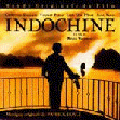 head...and
I usually use a Sony recorder for my own purpose, to record the things
I write...so while I was preparing some things for Indochine to show
to Régis, the recorder broke and I had no time to go out and
buy another one... so there was this Fisher-Price toy around the house
and I picked it up and recorded what I was working on in it...and it sounded
awful... just awful... the toy was missing the cassette door and every time
I pushed the record button I had to press the cassette manually...otherwise
it would come off (laughing)... head...and
I usually use a Sony recorder for my own purpose, to record the things
I write...so while I was preparing some things for Indochine to show
to Régis, the recorder broke and I had no time to go out and
buy another one... so there was this Fisher-Price toy around the house
and I picked it up and recorded what I was working on in it...and it sounded
awful... just awful... the toy was missing the cassette door and every time
I pushed the record button I had to press the cassette manually...otherwise
it would come off (laughing)... BS: (laughs) In other words...a truly
piece of junk...
PD: (laughs) The worst there is...anyway, when Régis came
I hadn't realize what a shock this would be for a director..so when entered
the room, he told me "What is this?", and I was like "Oh, it's a Fisher-Price!!"...the
situation was ridiculous...and then Régis told me "Are you telling
me that the biggest movie ever in France, with the biggest score ever
is being recorded on a Fisher-Price?"...and as the practical joker he
is he told me "I want you record everything you compose in the toy and when
you show it to the producers in France, I want you tell them that this
has been recorded on a Fisher-Price"...so, that I did! (laughs) BS:
(laughing strongly) I cannot believe it!
PD: And to this day I still have that Fisher-Price. BS: But you
aren't using it still, are you?
PD: No, of course not (laughs)...I have a much more expensive equipment
now with computers and everything you can imagine...but I will keep the Fisher-Price forever.  BS:
I would like to talk about now about two of your collaborations with Alfonso
Cuaron, I'm referring of course, to A Little Princess and Great
Expectations. What can you tell us about your relation with Alfonso and
the making of both soundtracks?
PD: Alfonso is a wonderful man and when he first showed me A Little
Princess I realized what a glorious and gifted work it was...I was stunned
by the camera movements, the editing, the acting ..and all of it coming from
the same person, the director, the auteur...I was thrilled to actually
going to work with him...and he loves music and likes very much to work with
the composer as a team...he suggested to use a child voice for the film song
and I showed him a demo with my daughter singing on it...and he instantly fell
in love with her voice...but it actually took a long time for him to convince
me to use my daughter... BS: Why was that?
PD: It's very simple...I don't want my children to be part of my work, I
want to keep them as far as I can from the movie world...so although I agreed
I didn't tell my daughter it awes her singing on the movie until it was premiered
in Los Angeles. BS: And how did she take it?
PD: Oh my God!, she was like "yahoooooo!!!!" (laughs)...I should have never
done that... BS: (laughs) Children are children.
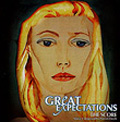 BS:
In the other movie you did with him , Great Expectations, you
used some electronics sounds that are not very usual in your music,
why was that?
PD: In this case
it was Alfonso who wanted to use pop-like music that was in accordance
to the songs he was using in the picture...it was a very difficult process
working with all the contemporary singers that were involved in the
picture and at the same time trying to come up with music that was up
to the film...in the end the album did very well and I'm very proud
of what the soundtrack ended up being.
BS: And what
can you tell us about Amsterdam?
PD: (laughs) I knew you were going to ask me this... BS: (laughs)
Was it so obvious?
PD: (laughs) No, not at all...what happened was that one day Alfonso,
he's a very funny man, told me "Come on Patrick, let's go to Amsterdam!"...and
I was like "I cannot go, I've work to do and so"...and he was "Come
on let's go have fun in Amsterdam (mimicking Alfonso's voice)"...so
I went to my wife and told her "Dear, Alfonso wants to go to Amsterdam",
and to my surprise she replied "Just go to have a boy's weekend"...
so we went to Amsterdam and got into a music shop... and I
started to play and he loved what I was playing, it was a very thrilling
experience for him being there watching me playing the piano, for
me it was very natural, but it was something totally new for him...it
was a wonderful weekend... BS: The only animated movie you've
worked on was Quest for Camelot, how was the experience of
working in animation?
PD: I have always loved animation...I still can remember the first
time I went to see Fantasia, I was 14 and fell in love with
the interaction between the images and the classical music... BS:
Yeah, it's astounding.
PD: Yep, so for me writing the music for the movie was very special,
and the main reason for it was that I wrote it while I was sick in
the hospital, very very sick...but to my surprise, and that of the
specialist that was treating me, the only thing I could do was write
music...the doctor was in awe of my will and told me repeatedly that
he had never seen someone in my condition able to do anything that
required mental effort. BS: And how long did it take you to write
the score, given the state you were into?
PD: Well, bit by bit, 26 second one day, a minute the next one...it
took me 8 weeks, which is a very long time... BS: A long time
indeed. I must tell you that you had us fans very worried during the
time you were in hospital, because there was so little information
about what was really happening and we feared the worst. What can
you tell us about this awful time in your life?
PD: Well, I had a thing called Acute Myeloid Leukaemia...this
is a very virulent cancer of the blood, and my type did not allow
to a bone marrow transplant, but a very, very aggressive chemotherapy...and
although it's less aggressive here that in the US I have to tell you
it's a very hard process...and Jose Carrera's example was very
inspiring for me. We were friends since my times in stage and he was
very supportive during all the process. BS: And are you completely
recovered from it?
PD: Yeah, completely... I go once a year for a blood test...but
it took me five years to mentally and physically recover from it... BS:
That's a very long time...
PD: Yeah, but now I feel younger than I felt before getting ill... BS:
That must be a great feeling...
PD: Yeah, when the doctor's told me I had a 60 to 70% of survival
all I thought of was the residual 30%...it was a very bad time for
me, that, thank God, it has passed...and there's one more thing I
would like to say about the time I was ill if you don't mind... BS:
How could I?... Go ahead.
PD: Well I would like to thank all the Spanish fans for the
support during that time...I still keep every single letter I received
during those months and I'll never throw them away...it was a great
help for me knowing that so much people was worried...and I remember
the walls of my hospital room covered floor to ceiling with hundreds
of letters...thank you very much! BS: That was the time when
you couldn't came to the concert in Seville.
PD: Exactly, during the rehersal of that concert, Maggie called
me and the choir was singing "Non Nobis Domine", and it made
me cry so much... BS: Fortunately you're here to tell and, well,
you can always come back!!!(laughs)
PD: (laughs) I would love to. BS: I will keep that in mind...
He,he,he.
PD: Okay...(laughs) 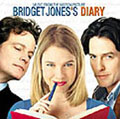 BS:
Before we reach your latest works I want to talk about something that
sometimes the common fan keeps asking and nobody answers. Some of
your recent works, and I'm talking about Bridget Jones' Diary, Killing
me Softly o The Galindez File haven't been relased, at
least not completely. What can you tell us about this practice?
PD: Well, the thing for these and other movies is that they are
not big blockbuster pictures and it's very difficult for the record
company to release a cd. The record industry is in very difficult
times and they don't have the money they used to have...people are
less committed into spending money...Galindez was not a very
big movie, so the risk of releasing an album was enormous; and while Bridget
Jones was a hit, the producers did not want a soundtrack cd to
interfere with the release of the first song album... BS: So,
it is unlikely that we fans would ever hear those soundtracks...
PD: Well, the thing is I've talking to my manager and we're thinking
of an auto-financed album containing those soundtracks... BS:
That would be great. Well, we're almost finishing the interview.
PD: (sadly speaking) Really? BS: Yep, but before we end, I
would very much like to talk about your latest work, Secondhand
Lions.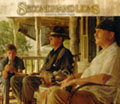
PD: That's great! BS: I must tell you that when I first heard
it, you absolutely blew mind.
PD: Is that so? BS: Yeah, I first heard long before I went
to see the movie and I was very intrigued from that time until I went
to the theatre...the music was so varied and changing that I couldn't
figure out what kind of movie it was. What kind of collaboration did
you have with Tim McCanlis?
PD: He's a wonderful guy...one year before I began scoring, he
phoned me just when the shooting was starting, and from the very beginning
he wanted me to do the score...he was very nice on the phone and he
send the script right away...I fell in love with it first time I read
it, and knew that this was going to be a very difficult one...this
movie was going to demand every single previous experience that I
have had scoring... BS: Absolutely...there's like a million different
styles in this soundtrack...
PD: Yeah, you have ethnic music, exotic music, action music, romance
music, tender... BS: Epic music...
PD: Lots of that...the movie stretched me in every direction, but
I absolutely loved it...it was a great challenge and a great joy to
record it with the Bratislava Orchestra...which delivered a great
performance...I'm sure you'll agree. BS: Absolutely.
PD: It was a great fun working with Tim...he's such a passionate
director...and I'm very proud of having worked with him. BS: You
must be...it's one of your finest works.
PD: You're very kind. BS: No, I mean it...the first time I
played the cd I was in awe of the first notes (humming the theme).
PD: (humming at the same time). BS: It reminded directly of Rozsa's Thief
of Bagdad.
PD: Well it is very funny that you're telling me that, because when I first
saw the movie and all the flashbacks, I thought "this movie needs music from
the 40's...this movie needs music like that of Rozsa, Korngold, Steiner..." 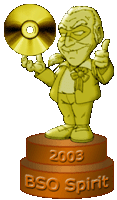 BS:
Well, if you're so proud of this work then I suppose you'll like to know what
I'm going to tell you right now. Once a year in our website we make a poll
among our readers in which they have to choose the best soundtrack in many
categories, and this year Secondhand Lions won the award for Best
Comedy.
PD: (very touched) Really?...oh, gosh, tell everyone that I'm so thrilled
and flattered...thank you very much for this award... BS: Thanks to you
for giving us such wonderful music...you deserve it.
PD: You're very kind...I'm very happy to hear that. BS: Well, I think
it should be great to end the interview with the funniest anecdote you can
remember.
PD: It is too difficult to think of this... BS: I have put you between
the wall and the sword...(laughs)
PD: (laughs)Yeah, oh god...what can I tell?, what can I...oh yes!. I know.
When we were dubbing Henry V the scene when the soundtrack has my voice
singing "Non Nobis Domine" (singing). BS: (singing at the same time).
PD: So...there I was in the sound cabin where we were dubbing the film,
and one song has been in mind all day, that of Barry Manilow, "I
wrote the song" (singing the song)...so I go to the toilet and while I'm
in it an they're playing Non Nobis...I'm singing very very loud "I wrote
the song that made the world sing!!!!!" (laughs) BS: (strongly laughing)And
they're hearing you?
PD: (laughs) I don't know...I'm all by myself singing (very loud)" I wrote
the song that made the whoooleeee.....". So anyway, I come back from the toilet
and the sound editors tell me "Okay Patrick, here is the scene dubbed"...and
there it is my very loud voice singing "I wrote the song" while Kenneth is
on screen reciting Shakespeare (strongly laughing). BS: (strongly
laughing, almost crying)That's hilarious!!!
PD: That is the funniest memory I have...Sergio, I must tell you
that it's been great talking to you, this has been a great interview. BS:
For me too, it's been great, I hope one day we would do it again.
PD: I hope it too, take care and best luck to you and your website. Adiós!
BS: You too take
care. Bye!
Interview
Carried by Sergio Benítez
Questions by Óscar Giménez and Sergio Benítez
|





